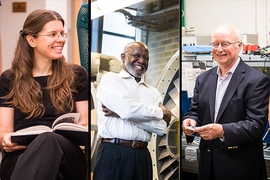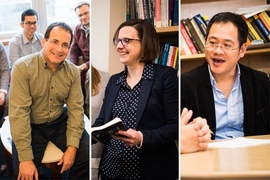Converting raw potential into a dissertation is no easy feat. Dependable mentorship can play a profound role in cultivating engaged, capable, and resilient scholars. Professors Paola Cappellaro, Warren Seering, and Lily Tsai have been honored by their graduate students as “Committed to Caring” for their adaptability and stable guidance as advisors, helping their students weather setbacks and continue to find delight in discovery, even in the midst of a pandemic.
Paola Cappellaro: Igniting enthusiasm
Paola Cappellaro is a professor of nuclear science and engineering. She leads the Quantum Engineering Group at the Center for Ultracold Atoms at MIT and is a member of the Research Lab for Electronics. Her research aims to enable practical quantum nano-devices, such as medical sensors and stimulators, as well as develop deeper knowledge of quantum systems and their environments.
As an advisor, Cappellaro effectively navigates the balance between attending closely to students’ needs while also giving them space to explore. Students fondly recall Cappellaro’s ability to summon details about minor experiments they conducted weeks before, or wish them well on an event they had once mentioned in passing.
Encountering research obstacles is de rigueur, particularly during graduate school. When students are stumped by experimental results, Cappellaro advises them to take “sideways steps” to consider the challenge from another angle. In her words, she aims to “cultivate and preserve [each] student’s love for research and science … especially when … things do not work out in the lab or because of external pressures.”
One external pressure currently affecting everyone is the Covid-19 pandemic. Many students had to make sudden, significant decisions about their lives or research in response. Cappellaro has been a reliable support, helping students decide whether to vacate or remain on campus, ensuring students were provided funds from the Department of Nuclear Science and Engineering to enable moves, and helping her laboratory group find ways to maintain connection and banter in virtual interactions.
A particular point of stress for many students is whether they will be able to move forward with their experiments and degrees, notes Cappellaro. In the short term, the lab has found ways to run their experiments remotely. Emphasizing the need to accommodate people with varied schedules, time zones, and child care in this trying time, Cappellaro is flexible in organizing group meetings and the research process. She notes, “I try to nudge people to reach out to each other even in lockdown” — and is excited that — “new collaborations among the group [have] sprout[ed] from this situation.”
Cappellaro says that fostering “a caring and open community, where one feels valued and welcomed to ask and provide help,” is critical to enabling graduate students to be productive. Building such a friendly and inclusive work environment is a mentoring guidepost identified by the Committed to Caring (C2C) program. Cappellaro notes that the “best strategy [as an advisor is] to foster cohesion among the student group so that they care for each other and help each other out.” Group outings such as the lab’s annual ski trip contribute to this feeling of community.
Cappellaro’s advising centers on igniting and reigniting enthusiasm for experimentation.
Warren Seering: Nurturing autonomy
Empowering students to become fully realized scholars, Warren Seering has a generous and supportive presence for his advisees and the wider community. Seering “makes it clear that his commitment to anyone working with him is equal,” according to a student nominator.
Warren Seering is the Weber/Shaughness Professor of Mechanical Engineering and Engineering Systems at MIT. His work has focused on dynamic systems and robotics, as well as on product design and development. Currently, his research addresses methods for evaluating and improving corporate product development capabilities.
Seering underlines the need to build a caring relationship with students, before difficulties arise in their lives or studies. He writes, “Communication is key. Establishing a relationship that enables communication has to happen before the [hardship] so that students know they can look to an advisor for support.”
Seering speaks to the dilemmas of an advisor’s focus during the pandemic: “It’s tempting to say that the urgent [is] constantly displacing the important, but for the last six weeks, so many things have been both urgent and important.” He normalizes the fluctuations students are having in mood and productivity. Seering notes, “We need to be on call for our students, and conversations need to include wellness check-ins to give students the chance to ask for help or guidance.”
An uplifting voice, Seering is a champion of students at the Institute. One student recalls being discouraged by others at the Institute from pursuing the PhD. Some said the student’s research was too interdisciplinary, or that being older would be an impediment. When the student turned to Seering, the response was supportive: “Seering is a big reason why I chose to follow through with completing my PhD.” Validating students by demonstrating interest in their research and belief in their capabilities is a mentoring guidepost.
In the research process, Seering’s ideal is for the advisor to enable students to develop independent research capabilities. He emphasizes the value of students setting their own short-term research agendas.
“Given the freedom and lack of structure associated with independent study, keeping to a schedule is a challenge; it takes practice,” writes Seering. He encourages students to closely track work hours and achievements, then limit professional work to 40-50 hours per week to preserve work/life equilibrium, a mentoring guidepost.
Students affirm that these methods are invaluable. Writes one student nominator, “Seering keeps me from veering off track, while allowing me to push the limits … [providing] the ultimate balance of high commitment, availability, and guidance.”
Lily Tsai: Solidarity and resilience
A “wise and perceptive mentor,” Lily Tsai attends closely to her advisees’ well-being and intellectual growth, according to student nominators.
Lily Tsai is the Ford Professor of Political Science. Tsai is also the founder and faculty director of the MIT Governance Lab, a group of political scientists working collaboratively with practitioners on research and innovation in citizen engagement and government accountability. Her research focuses on Asia and East Africa.
Exceptionally generous with her time, Lily Tsai is available for students whether it is the week or weekend, and even when she is on leave. Notably, though, she explicitly does not set the same standard for her students. Writes one nominator, “she encourages us to take weekends off and to take vacations, and respects these times by not emailing or making demands on us.”
When students are facing hardship, be it academic or personal, Tsai is a reliable support. One student mentions Tsai’s enduring encouragement as their dissertation proved harder to complete than anticipated: she “signaled that she believe[d] in me as a scholar — which is really important when facing self-doubts.” Another student recalls being invited to spend Christmas with Tsai and her family when in the midst of a distressing life shift.
Bolstering diversity in concrete ways matters to Tsai. She attends student-faculty meetings and brainstorming sessions exploring gender and diversity within the department, and serves on a diversity committee. Tsai talks openly with her students, providing “invaluable advice,” in the words of one student nominator, on navigating the balance between family, life, and work as a female academic.
Tsai admires scholars who are good at “talking to, understanding, and translating across a range of people from different families, cultures … [and] communication styles” because they can “synthesize different streams of data and ideas.” She works to build these skills as part of a toolkit for her mentees. Such dedication to fostering a friendly and inclusive work environment is a mentoring guidepost.
Exploring the dynamic tensions between flexibility and certainty bodes well for navigating a pandemic, in Tsai’s view. She notes, managing amid unpredictability is “hard because people naturally want structure and certainty — and that decreases with diversity.” Varied backgrounds and communication styles can lead to miscommunication and tension. “But as we’re finding … being able to live with and adjust to high levels of uncertainty can be a huge strength.”
The Committed to Caring program is an initiative of the Office of Graduate Education and contributes to its mission of making graduate education at MIT “empowering, exciting, holistic, and transformative.”
C2C invites graduate students from across MIT’s campus to nominate professors whom they believe to be outstanding mentors. Selection criteria for the honor include the scope and reach of advisor impact on graduate students’ experience, excellence in scholarship, and demonstrated commitment to diversity and inclusion.
By recognizing the human element of graduate education, C2C seeks to encourage excellent advising and mentorship across MIT’s campus. More information about these and other C2C honorees and their advising practices may be found on the Committed to Caring pages.











